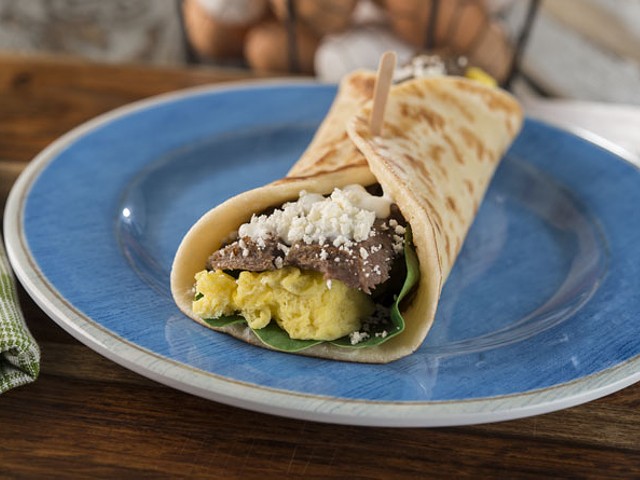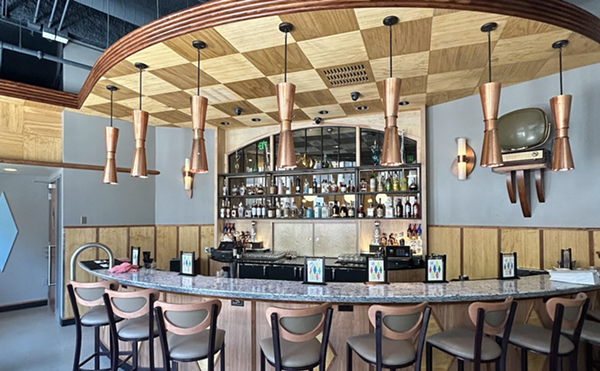Bite into a slider at Green Dot Stables, nibble the beef carpaccio at Wright & Co., nosh on the curry lamb at Standby, and you're tasting meat sourced by John Muster. The longtime Detroit meat man has procured the Motor City's proteins for over two decades for Quality Meats, thus witnessing from the inside the shifts in and blooming of downtown's dining scene. We sat down for a conversation on the life of a modern meat man while enjoying a plate of short ribs at Ottava Via.
Metro Times: How many restaurants are on your account?
John Muster: About 20. I used to have over 100. It's funny because in sales they always talk about the 80-20 rule: 20 percent of your customers are 80 percent of your business. Well, I used to have 100, now I have 20. I cut loose the extra and my 20 customers — I'm very close and tight with them.
I work with Les (Molnar) and them so Green Dot, Huron Room, and Johnny Noodle King. Ottava Via, Mercury, Gold Cash Gold, Peterboro, Wright and Company, Sugar House, Standby, Cliff Bells, Bronx Bar, Avalon Bakery, and I'll be selling to chef Kate (Williams) at Lady of the House when she opens. Jon Kung (of Eastern Market's Kung Food) — I drop stuff by his studio.
MT: Is there a meat that you won't touch?
Muster: I'll try everything, but I'm not fan of brains. The texture is what it is. The other would be kidneys. Outside of that, I'm pretty much wide open. Lamb fries; tongue. You name it. I've had it, and I've enjoyed most of it.
MT: What does the modern meat man look like?
Muster: If they had to rely on me, someone my age (59), then they'd be out of business. Chefs want to talk to someone who can relate to their experiences, and while I have a lot to offer and I've been successful, we're breaking the mold by hiring younger people like Brennan Calnin, (former chef at Imperial and Townhouse). He decided he didn't want to work in restaurants anymore, but he still has a passion for food, he's a good chef, so I talked him into coming to work for us and he's doing a phenomenal job. And we did the same thing with my daughter, Nicole, who just started with us a month ago.
They're starting at 29, 30, so they're in that sweet spot. They're socially connected, passionate about food, and there's that combination of ego and empathy. They want to succeed; and the empathy — they can grasp what the chef needs, and they're able to fill the need.
MT: The local food scene is much different than it was 10-15 years ago. How is that playing out in the local meat industry and how does that change what you do as a meat man?
Muster: Before, you tried to sell someone the commodity item, then follow up with a specialty item. That's the way it was done. Now, it's the opposite: You lead with niche item, and the other stuff kind of follows.
For example, we have a chef we've been trying to sell for a while ... but we couldn't break the ice. We found out he was trying to dry age ducks, and nobody was doing that, and I had never had dry aged ducks. But then he asked if we could do it I said, "Yeah, of course we can! No problem!" Not knowing if we could or couldn't. It turned out we could, we did, and because of that we've developed a relationship, and we're selling him dry aged ducks, among other things.
MT: So there's a lot more demand for specialty items?
Muster: Back in the day, especially in Detroit, it was not uncommon for chefs to come up through the ranks. Maybe they were a bus guy, prep cook, now they're the chef. Today, more chefs are culinary trained so they're smarter, more demanding, and it's not just a way to collect a check.
They'll ask you about free-trade chocolate, which is a great story in itself, or the dry age ducks, or can you butcher or pack something a particular way. A chef might ask me about a product he had while on the other side of the country and you need to find a way to source it.
MT: Are there specific meats that are far more popular now than they were a few years ago?
Muster: Commodities like strip loins, rib-eyes, those don't go away. Dry age has been big and we're doing that now ... and we've been really successful. What we do that others don't is we don't have a stock supply that we pull from. We custom age for the chef. If you tell me that you want regular choice to prime to a A5 Wagyu, then we pull them and specifically age them to spec.
MT: What's a typical day like for a meat salesman? You seem to be one of those guys that everyone likes chatting with.
Muster: I'm up at 4:30, 5 a.m., and I'm a big social media guy so I'm on Instagram, Facebook seeing what chefs are posting. I follow people on Instagram that are a little ahead of the curve on what we're seeing here, so they give a little exposure and I get my ideas from some of that.
I meet people, and I talk about food. I eat and I hang out, to oversimplify it. If I was here with you at the bar and this is the place that I'm trying to sell, then I overhear the chef talking or a comment from the table, then I can use that information to offer them more. You can't do that if you walk in, get on your laptop, do an order entry, and once your task is done, get up and leave. Lingering is worth its wait.
It's fascinating, and on a selfish level, I learn. It's not only going out one way. Even if there's a chef that's demanding — I get home at the end of the day I'm pumped about that experience. When I see the chefs that I work with, I'm always excited to excited to tell them what I know and hear what they have to tell me.
MT: What's the best dish in Detroit at this very moment?
Muster: Bowls at Johnny Noodle King. I'm a big slider fan. Any special at Ottava Via is my favorite that day; the sticky ribs at Katoi .... it's hard to say — there's a lot of good stuff.
MT: What's your favorite part of Detroit's food scene?
Muster: It used to be that if a restaurant closed, it was the death of the Detroit food scene. What I'm most happy about ... is I think we're almost getting to a place where certain attrition will happen but no one is going to be devastated. The variety is great. It used to be if you bring someone in from out of town and they say, "Where do you go for good food?" Well, there are one to two good restaurants. Now ... the opportunity to satisfy a variety of tastes is spectacular.
And the chefs are fucking great. They're exciting. They're intense. They're pushing the boundaries. And they're making guys like us work hard.
MT: What do you think of vegetarians?
Muster: I dated one once. I had to break up with her, and the first thing I did after was have a carpaccio.
(The interview was edited for length and clarity.)






